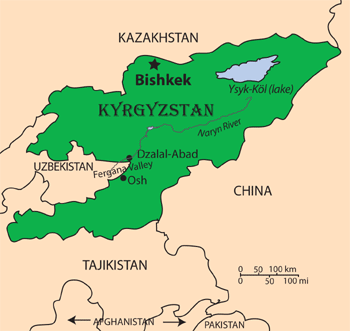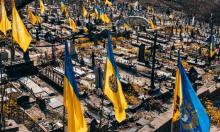Political power in Kyrgyzstan pays like nothing else
Kyrgyzstan is a small and very impoverished country
A wave of public protests has swept across the southern part of Kyrgyzstan. The opposition is calling for the resignation of Kyrgyz President Askar Akaev and accusing the authorities of rigging the latest parliamentary elections. Oleg Panfilov, a director of the Center of Extreme Journalism comments on the developments in Kyrgyzstan:
“Kyrgyzstan is a small and very impoverished country. Power is the only source of dividends to the local high-ranking politicians since the national economy is almost nonexistent. Therefore, power becomes a business. No business activity can compensate for the loss of power. From my point of view, the origins of the latest developments in Kyrgyzstan can be traced back to recent history of the former Soviet Union. Not unlike all the politicians of the post-Soviet era, the Kyrgyz opposition leaders soiled their reputation while being part of the power structure, they got kicked from the top, and now they want to regain control.
"I am greatly concerned about the regional factor that may play a crucial role in the confrontation between the authorities and the opposition. A scenario involving the split of the country into the northern part and the tribalistic southern area (comprising three regions around the cities of Osh, Jalal Abad, and Batken) is taking shape in the media as we speak. Southern Kyrgyzstan is chiefly an agricultural area as opposed to the northern part that has some economic infrastructure or so the say. As regards some other factors contributing to political instability in Kyrgyzstan, we should point out that the country is actually divided between various clans. We should also bear in mind the factor of Islamic radicalism that is applicable mostly to the south. The north looks quieter, it is Mr. Akaev's territory, and its residents feel less enthusiastic about revolutionary changes looming on the horizon."
Mr. Akaev's political longevity is hardly a product of his amazing abilities. Its foundations were repeatedly strengthened by numerous mistakes made by those who were quick to call themselves the opposition shortly after they lost their jobs with the central or regional government. In most cases the opposition leaders keep talking about their presidential ambitions. In line with a typical mentality of the people living in central Asia, the position of a president has become an embodiment of the highest lifetime achievements and a guarantee of a comfortable niche in society.
The opposition has never regarded parliamentary elections as an important stage of political progress. The political opponents never use such arguments as 'political programs' or 'economic reforms' while holding a debate.
No necessary preparations for a revolution are in place here as opposed to Ukraine where the opposition was shaping up for the last 4-5 years as the political activity rose steadily. Nothing of the kind took place in Kyrgyzstan. Given the lack of unity in the Kyrgyz opposition, it may as well fail to produce a powerful unifying force required for making the next move. Since the clashes between different ethnic groups that happened in the city of Osh in the June of 1990, everything has been running in a relatively peaceful way throughout the whole period of Kyrgyz independence.
Mr. Akaev has been holding office since1991 after winning the general elections as the only candidate on the list. In July 1998 the opposition was taken aback by a ruling of the Constitutional Court of Kyrgyzstan which allowed Askar Akaev to run for president in the next elections. Needless to say, Mr. Akaev was elected president of Kyrgyzstan.
The revolutions in Georgia and Ukraine were fueled by the strong public sentiments against the Kremlin. The sentiments were directed against Mr. Putin, to be more precise. Those sentiments simply can not happen in Kyrgyzstan because the country has a large percentage of national minorities predominantly composed of the Slavs including Russians, Ukrainians and Belorussians. Despite their Kyrgyz citizenship, they are traditionally referred to as “compatriots” by the Kremlin.
Aside from showing support to Mr. Akaev by setting up military bases on the Kyrgyz sole, Kremlin has lately promised to invest in Kyrgyzstan's economy. In light of the above, the opposition leaders are calling on Mr. Akaev to step down only because they resent him personally In the meantime, they would not object to the Kremlin's inference into the internal affairs of their country.”
Subscribe to Pravda.Ru Telegram channel, Facebook, RSS!




